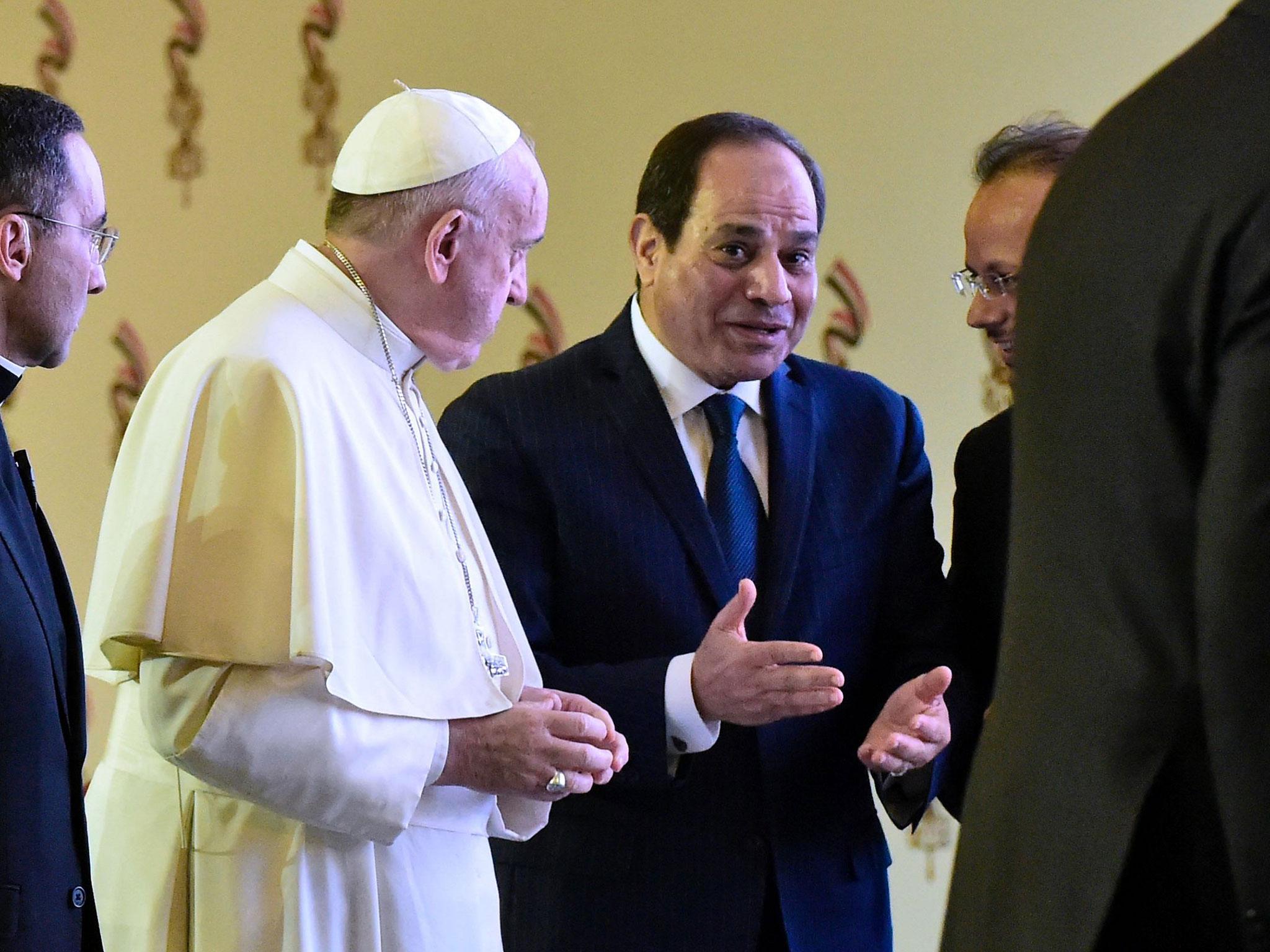Sisi apparently believes that the Pope's visit to Cairo will prove Egypt is safe for Christians – Isis has other ideas


Your support helps us to tell the story
From reproductive rights to climate change to Big Tech, The Independent is on the ground when the story is developing. Whether it's investigating the financials of Elon Musk's pro-Trump PAC or producing our latest documentary, 'The A Word', which shines a light on the American women fighting for reproductive rights, we know how important it is to parse out the facts from the messaging.
At such a critical moment in US history, we need reporters on the ground. Your donation allows us to keep sending journalists to speak to both sides of the story.
The Independent is trusted by Americans across the entire political spectrum. And unlike many other quality news outlets, we choose not to lock Americans out of our reporting and analysis with paywalls. We believe quality journalism should be available to everyone, paid for by those who can afford it.
Your support makes all the difference.It must be the most dangerous trip Pope Francis has ever made, into the very heart of the capital of the largest Arab nation whose Isis tormentors long ago decided that Christians would be their “prey”. But Egyptian President Abdel-Fattah al-Sisi, who used to be a field marshal, seems to be turning it into a symbolic demonstration of his army’s power.
The man of peace, it seems, is going to be protected by thousands of soldiers and even the great prayer meeting on Saturday, with 21,000 worshippers, will be held in the Air Defence Stadium in Cairo; the army is going to show a film of the destruction of 54 churches destroyed by “terrorists” but restored by the army. What the Pope will make of all this is anyone’s guess.
There is no armoured vehicle for him. Just a golf cart at the Saturday prayers. It all sounds a frightening prospect for anyone interested in his safety. But why does the Pope think he’s coming to Cairo? Well, of course, he’s meeting Sisi and he will hold talks with the Grand Imam of Al-Azhar, Ahmed al-Tayeb. The Pope has been – if such a phrase can be used – the most pro-Muslim pope of modern times. His predecessor, the unlamented Benedict, managed to so offend al-Azhar that he broke ties with the Vatican. Francis will also meet the Coptic Pope Tawadros the Second.
But no message of peace from him is going to stop Isis in its campaign of cleansing the Christians from Sinai and attacking their churches – as it did earlier this month with suicide bombings in Alexandria and Tanta at a cost of 46 dead. There are perhaps 10 million Copts in Egypt – a mere 10 per cent of the population, a quarter of a million of them Catholics. Perhaps the Pope plans to comfort them – that is certainly what the Christians of Egypt tell you – but the Egyptian government, rather weirdly, believes that his visit will encourage “religious tourism”, Francis’s presence “proving that the country is safe”, according to one Cairo journalist. This is a very dodgy assumption given that Isis is on the warpath and once published a photograph of the Vatican with the black and white Isis flag fluttering over it. Isis, in other words, talks war. Francis talks peace.
But back to religious tourism. Joseph and Mary brought the infant Jesus to Egypt to escape King Herod – or so it is written in the Bible – and Cairo newspapers have been quoting tourism officials as planning for an influx of Italian visitors in the wake of the Pope. This, too, is probably an illusion. Last year an Italian student called Giulio Regini was found tortured to death on a highway outside of Cairo – which certainly didn’t do a lot for tourism. The Italians suspected that the Egyptian security services were behind the young man’s death. Again, that wasn’t exactly good for tourism. Be sure the Pope knows many details of this murder.
But he’s going to visit one of the churches recently attacked in Cairo and follow through on his demand for “dialogue” between what one Muslim official called “the two divinely revealed religions”. The problem is that the most frightening organisation in Egypt – Isis, of course – has long ago proved that “dialogue” is the last thing on its mind.
There have always been sectarian problems between Christians and Muslims – mainly in Upper Egypt – but the appearance of Isis has sharpened these differences. Most recently, Christians have been referring to their victims as “martyrs”.
Egypt has been weighed down by massive economic problems which al-Sisi rather rashly claimed he could solve after his election. But inflation has gone up by 30 per cent in recent months, a rather more pressing problem for the population than a “tourist” Pope. Al-Sissi has been appearing at a youth conference, trying to explain that the economy will soon recover. But that’s what he said when he decided to use the army to widen the Suez Canal. And according to a communiqué from that same army, the Pope actually believes that Egypt is safe. But will Egyptian Christians be as safe during his 27-hour visit?